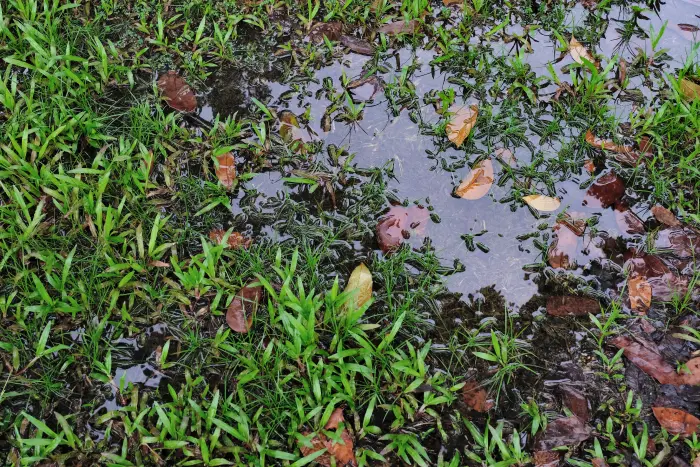
Does it seem like there are always way more mosquitoes after a rain? It’s not just your imagination—it’s a real phenomenon with clear scientific reasons behind it. Fortunately, the fact that you recognize this surge in mosquitoes means you’re already on the right path to doing something about it. Understanding why this happens and where to focus your efforts is a crucial part of how to prevent mosquitoes after it rains.
Here in Florida, where rain showers are frequent, knowing how to manage your environment after a storm can make all the difference in keeping those pesky mosquitoes at bay.
Can You Prevent Mosquitoes After It Rains?
Yes, the good news is that there are several steps you can take following a heavy rain to greatly diminish the influx of mosquitoes that typically follows. By acting quickly and efficiently, you can prevent these pests from turning your yard into their breeding ground.
- Drain Standing Water: Mosquitoes lay their eggs in standing water, so the first thing you should do is eliminate any sources of stagnant water around your property. This includes emptying out flower pots, birdbaths, gutters, and any other containers that might have collected rainwater.
- Check for Clogged Gutters: After heavy rain, gutters can easily become clogged with debris, creating pools of water that are perfect for mosquito breeding. Make sure your gutters are clear and draining properly.
- Trim Overgrown Vegetation: Mosquitoes love shady, cool areas to rest during the day. Trim back overgrown bushes, tall grass, and other vegetation to reduce these resting spots in your yard.
- Treat Water Features: If you have ponds, fountains, or other water features in your yard, consider treating them with a larvicide to prevent mosquitoes from using them as a breeding site. These products are safe for pets and wildlife but deadly to mosquito larvae.
Environments Mosquitoes Thrive In
Rain and mosquitoes have a direct cause-and-effect relationship. Water is a vital building block for mosquito life, and different types of mosquitoes emerge in waves after rain.
- Mosquitoes in Floodwater: These mosquitoes lay their eggs in soil where water will eventually accumulate. After a heavy rain, the eggs that have been waiting in dry conditions for weeks or even months will hatch, leading to a sudden surge in mosquitoes.
- Mosquitoes in Containers: These mosquitoes thrive in man-made containers that collect water, such as buckets, flower pots, and even old tires. After rain, these containers become breeding grounds for mosquitoes.
- Mosquitoes in Stagnant Water: Any puddles or areas of standing water left behind after rain are ideal breeding sites for stagnant water mosquitoes. These types of mosquitoes love the high bacteria content in stagnant water. They lay their eggs directly in these water sources, leading to an explosion of mosquito activity.
Ready for a quote?
Click below to leave your information and we will call you right back!
Leave your information and we will give you a call back.
*During normal business hours. After hours calls will be returned the next business day.
Dive Deeper into How Rain Affects Mosquito Behavior
Mosquitoes and rain are inextricably linked, especially here in Florida where rain and mosquitoes are both so abundant. Learn more about why with these frequently asked questions about rain and mosquitoes.
Does Rain Cause Mosquitoes to Hatch?
Yes, in many cases, rain does cause mosquitoes to hatch. Mosquito eggs and larvae can remain dormant in the topsoil for months or even years, just waiting for the right conditions to develop. When rain arrives, it provides the moisture necessary for these dormant eggs to develop into adult mosquitoes.
Additionally, rain often leaves behind puddles and pools of water—prime locations for mosquitoes to lay new eggs, which will hatch into larvae and eventually become adult mosquitoes if left undisturbed.
Does Rain Attract Mosquitoes?
While rain itself doesn’t attract mosquitoes, the water it leaves behind certainly does. Mosquitoes are drawn to standing water because it’s essential for their reproductive cycle. They lay their eggs in still water, so any puddles, ponds, or containers filled with rainwater become instant breeding grounds.
In other words, rain sets the stage for mosquitoes to thrive by providing the necessary environment for their lifecycle.
Do Mosquitoes Fly in the Rain?
Mosquitoes can fly in the rain, but it’s not easy for them. A single raindrop can knock a mosquito out of the sky, though they’ll get back up and keep flying.
While rain itself might not deter mosquitoes, wind does. Strong winds suppress mosquito activity, which is why large fans can be an effective mosquito control method—especially when combined with other preventative measures.
Call Your Local Mosquito Experts After It Rains!
Rain creates the perfect conditions for mosquitoes to thrive. By understanding the relationship between rain and mosquito activity, you can take proactive steps to protect your yard and home. However, sometimes, the best way to enjoy your outdoor spaces without the constant buzz is to call in your local mosquito control experts.
At Forest Pest Control, we specialize in mosquito control tailored to the unique conditions of Florida. Contact us today to learn more about how we can help you keep these pests at bay all year round.
Back to Mosquito Control Service

